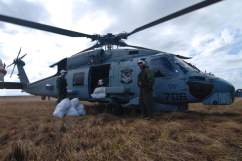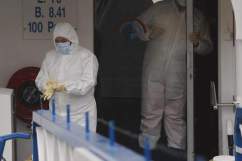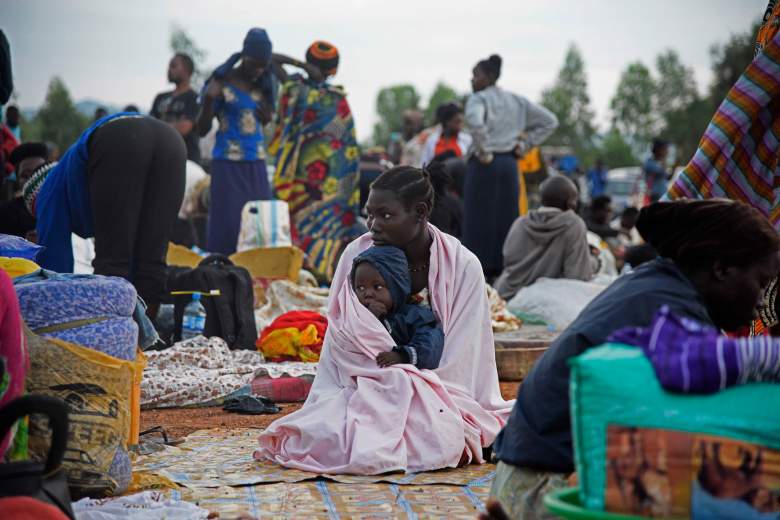
A South Sudanese refugee woman carries a child on her knees as she sits inside a make-shift camp at Nimule border in Uganda. (Getty)
South Sudan, which on July 9 was celebrating its fifth year as an independent nation from Sudan, is now facing a humanitarian crisis.
A civil war stretching some three months has killed at least 500 people, according to the BBC. The country’s split, between both troops and civilians loyal to either President Salva Kiir and Vice President Riek Machar, has displaced thousands.
Now, with some 15,000 people seeking refuge through the United Nations in close quarters, there is a suspected cholera outbreak.
The country’s capital, Juba, is facing upheaval, violence and looting, according to the Guardian. The West has been criticized for under-reporting the crisis, which, in turn, leads to less foreign aid.
Chinese officials announced this week they would send an envoy to help there, where it has energy interests.
Here is what you need to know about the ongoing crisis in South Sudan:
1. South Sudan Gained Independence in 2011 but Ongoing Civil War has Erupted Since 2013.
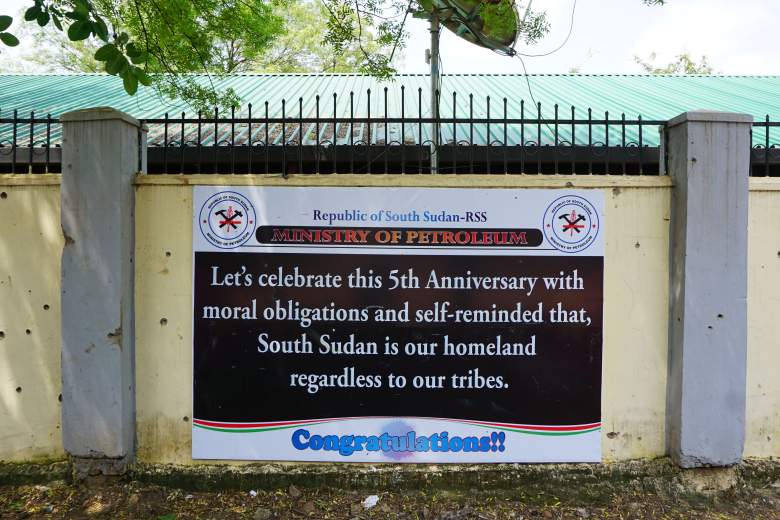
South Sudan was hoping to celebrate its fifth year of independence. It is currently facing unrest and a cholera outbreak. (Getty)
After nearly 40 years of violence and unrest because of sectarian disputes and “slavery” under Sudanese authority, South Sudan emerged as an independent nation on July 9, 2011. The successful referendum brought applause from world leaders, including the United Kingdom’s David Cameron and President Barack Obama.
“Today is a reminder that after the darkness of war, the light of a new dawn is possible,” Obama said in a statement. “A proud flag flies over Juba and the map of the world has been redrawn. These symbols speak to the blood that has been spilled, the tears that have been shed, the ballots that have been cast, and the hopes that have been realized by so many millions of people. The eyes of the world are on the Republic of South Sudan. And we know that southern Sudanese have claimed their sovereignty, and shown that neither their dignity nor their dream of self-determination can be denied.”
But two years later, South Sudan, one of the poorest nations and a country of about 11 million, was split in two. President Kiir ousted his entire cabinet, including his vice president, Machar, who wanted to challenge Kiir — from a different tribal group — for the top spot.
The violence erupted between presidential guards who aligned themselves with the two ethnic groups Kiir and Machar identify with.
Since then, there has been off and on violence in South Sudan. And, along with the U.N., the African Union has organized a regional military force to aid the country.
2. Peace Talks have Failed, Despite U.S. and African Union Pressure
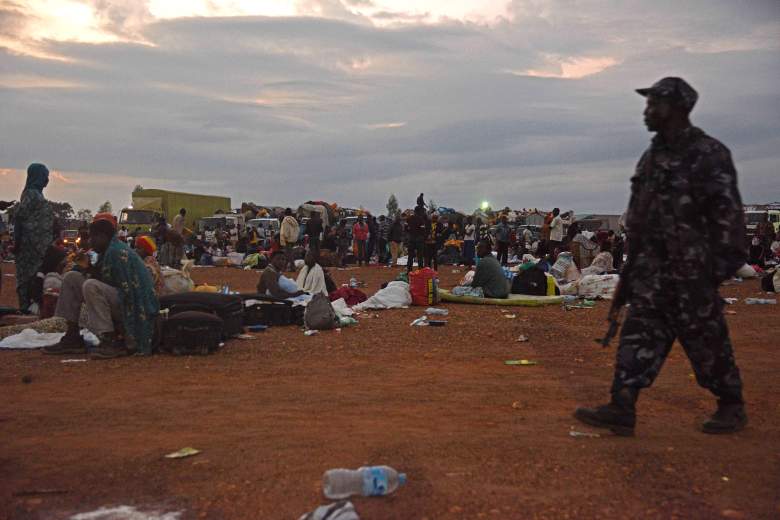
A military officer walks by evacuated people inside a make-shift camp at Nimule borderr in Uganda. There are some 20,000 people in the Nimule area who want to cross over to Uganda, but most were stopped by South Sudanese soldiers who also stripped and beat some of them, according to an AFP journalist at the scene. (Getty)
Political pressure from the U.S. and the African Union wasn’t enough for the South Sudanese government to demilitarize the capital city and sign a peace agreement, Al Jazeera reported in August. Kiir said then he had reservations about the deal and needed more time.
The Obama administration set a 15-day deadline, which was met with criticism over the bigger issues there.
“Punishment threats can also backfire under certain circumstances. Even when levied equally among the sides, sanctions have greater negative political impact against sitting government leaders than outsiders. They provide incentive among leaders to make decisions based on their personal welfare rather than the objective needs of their constituents. Beyond sanctions, general threats, significant outside pressure, and arbitrary deadlines also affect incumbent leaders disproportionately. They have the most to lose and, because of this, the pressure may embolden outside factions to delay in the hopes of a better deal. Finally, deals struck by duress have less chance of lasting and their dissolution can cause greater setbacks than any purported gains,” Brian Garst wrote in a paper entitled “Stumbling Toward Peace in South Sudan” for the Center for Freedom & Prosperity.
Hoping to ease tensions, President Kiir in February appointed his rival Machar back to his old position.
3. There are Thousands of Refugees in U.N Camps Now & Facing Cholera Outbreak
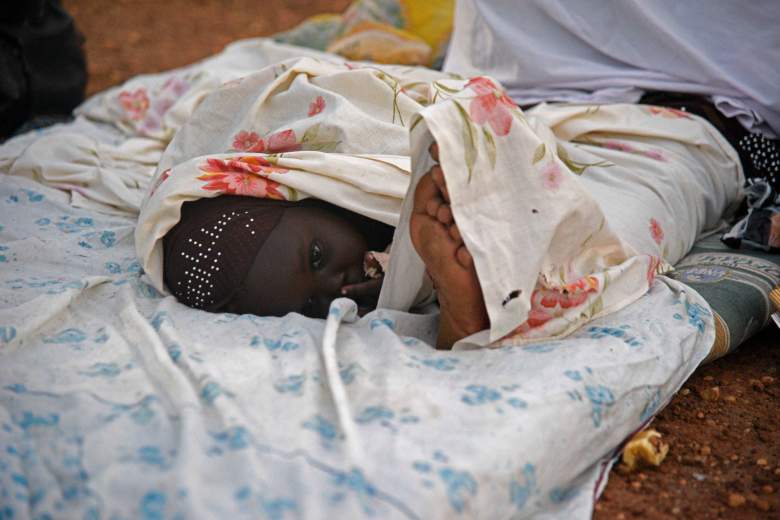
A toddler sleeps near its mother’s feet inside a make-shift camp at Nimule border. (Getty)
Because of the recent violence and looting, thousands of South Sudanese are rushing to the Ugandan border for safety. More than 90 percent of the Ugandan-housed refugees are women and children, according to U.N. officials.
“People are arriving in Uganda tired and hungry. Many of them have walked for days carrying belongings. Others are suffering from malnutrition after walking without food for days. Militia activities in some areas of South Sudan have made it difficult to harvest crops in recent months,” U.N. Refugee Agency spokesman Leo Dobbs said.
The website New Vision reports that “Children, whose parents from war ravaged South Sudan are seeking refuge in Uganda, are facing severe acute malnutrition, due to poor feeding.”
With a U.N. food storehouse looted and destroyed, combined with poor economic conditions and contaminated food and water, health concerns have increased significantly. Nearly a dozen people have died from what appears to be cholera — and officials worry it will spread to others, according to the Associated Press.
Last year, 47 people died in South Sudan in a cholera outbreak, and 167 died from the disease — an acute watery diarrhea which kills fewer than 1 percent of sufferers if there is proper treatment with oral rehydration salts, according to the World Health Organization — in 2014, the AP reports.
4. South Sudan has Received Aid & Wants More, but Donors are Tiring
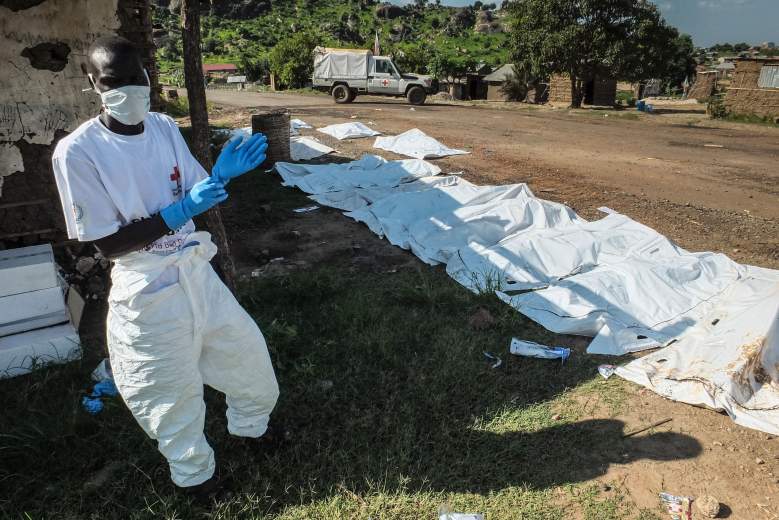
A South Sudanese ICRC (International Red Cross Committee) worker is seen next to body bags with the remains of victims of the past days violence in Juba. (Getty)
The U.S. has historically spent more than any other country aiding South Sudan — even spending an emergency $16 million last year. American officials say it’s a commitment to “ensuring we don’t see a catastrophic situation in South Sudan.
“Obviously that is a humongous amount of money and I think it underscores the commitment the U.S. has to the country of South Sudan and particularly to the people of South Sudan who have been affected by this conflict,” Office of U.S. Foreign Disaster Assistance Director Jeremy Konyndyk told South Sudan in Focus.
“We made a large effort in 2014 to ensure that South Sudan would not deteriorate into famine conditions. We’re making a very large effort this year to make sure famine is avoided,” Konyndyk said.
Worldwide humanitarian organization Oxfam is encouraging donors to help its work supporting survivors and refugees.
But in an interview with Foreign Policy, South Sudan Foreign Minister Barnaba Marial Benjamin said the country is seeking loans from “friendly countries, from the international organizations.”
“Right now, it’s our position and most of the donor community that we’re not talking about a bailout; we’re not talking about budget support; we’re talking about a phased approach where we will be trying to meet whatever steps the government does,” said Gunnar Holm, deputy ambassador to South Sudan for Norway, a member of the so-called “Troika” of top donors to South Sudan that also includes the United States and Britain, the Foreign Policy article reads.
The constant money-dumping into a war-torn country rife with violence and economic collapse is frustrating donors worldwide.
“We’re constantly in this discussion: Why should we keep putting money on this when according to the latest report they’re in the market for more attack helicopters?” said one Western diplomat in Juba, who requested anonymity to speak freely with Foreign Policy.
5. Civilians & Journalists are being Targeted in a Human Rights Battle
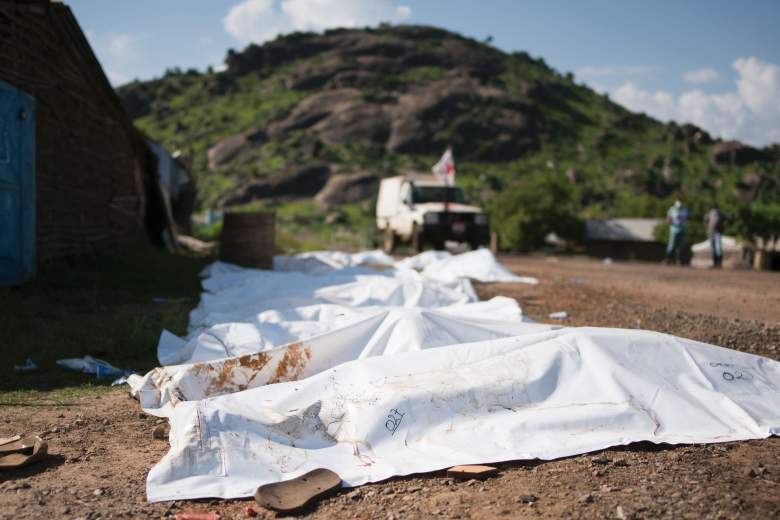
Numerous body bags in South Sudan. (Getty)
Both sides in the latest conflict are civilians, according to Human Rights Watch:
Amnesty International, a human-rights-focused non-governmental organization, is hoping added pressure by outside forces will help ensure justice in the conflict, which includes war crimes on civilians.
“International law is clear — both sides must refrain from attacking civilian objects, including UN sites where desperate civilians are sheltering. The rival parties must remove military objectives from civilian areas and work with the UN Mission in South Sudan to provide civilians with safe passage out of frontline areas,” said Elizabeth Deng, Amnesty International’s South Sudan Researcher.
Journalists have recently been targets, too. In a statement issued this week by the U.N., officials are asking the South Sudan government to release Alfred Taban, the chief editor of the Juba Monitor, a daily English newspaper.
Taban wrote an editorial calling for President Kiir and Vice President Machar, to step aside, criticizing them for their unsuccessful implementation of the August 2015 peace agreement. He is currently being held without charges.
Taban has pushed the limits in Juba, comparing its climate toward the press to that of Khartoum, the capital city of northern Sudan.
Before his arrest the government confiscated his paper. “I knew they would react negatively,” Taban told the Christian Science Monitor.
